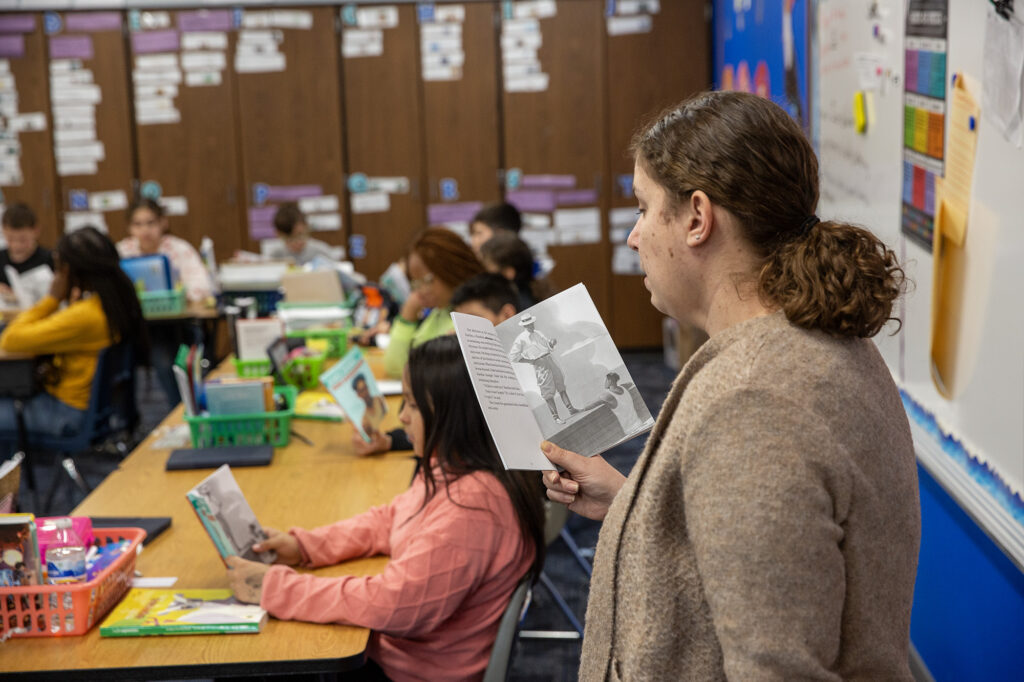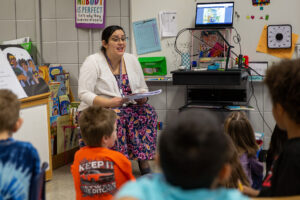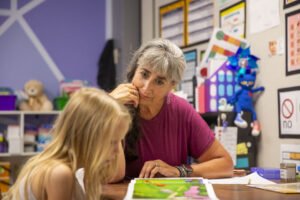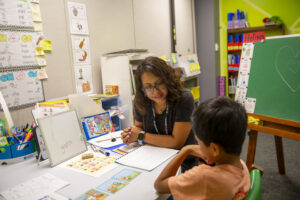Growing Readers boosts reading scores and confidence
Last August, nearly half of Melissa Teitsma’s second-grade class scored below average in reading. The benchmark test is given at the beginning of each school year.
Learning disruption caused during the pandemic has lingered, causing reading scores to stagnate.
“It depends on the class,” says Melissa, who teaches at Woodland Elementary in the Elkhart Community Schools district. “This year’s class, I had quite a few that were significantly below grade level (in reading).”
Studies of test scores conducted by Stanford and Harvard researchers identified Indiana as one of 10 states where students have lost ground in reading scores since 2019.
Teachers see students struggle. Kids do not engage in class. And parents aren’t sure what to do.
“I don’t always think that some parents know how to help. So for them to go somewhere where they can get that help, I would love it,” say Melissa.
Elkhart Public Library is addressing the problem. Growing Readers is a program working with parents and kids ages 3-8. Tutoring helps bring reading skills to grade level, preparing students for the third-grade reading assessment.
Growing Readers also builds confidence and skills to achieve greater successes.
Education experts say Growing Readers has a lasting impact in building student confidence.

<< Click here to join the waitlist for Growing Readers >>
Falling behind
Melissa isn’t the only teacher with students who need extra help. And the problem isn’t only in the elementary classrooms.
Karen Sproul, a Title I pre-kindergarten teacher at Hawthorne Early Learning Center, sees students with a variety of issues.
“We ask ourselves every year why these kids can’t focus, why they can’t sit down,” she says. “It’s not just one thing.”
Mary Catherine Kreiger-Miller, a kindergarten teacher at Pinewood Elementary in the Elkhart district says she sees problems, too. Teachers make time to work with students one-on-one, but ever-growing instructional and professional demands make it difficult for kids to catch up.
“I can’t always provide those small group opportunities for teaching,” Mary Catherine says. “It’s really hard to get them caught up to where they need to be at the end of the year.”
Kathy Meyer Reimer, chair of elementary education at Goshen College, says Indiana ranks nationally in the bottom half of states for literacy rate.
“There is a lot of need (for reading tutoring),” says Kathy, who also serves as board president for Goshen Public Library. “Elkhart County is not an exception. The literacy rate has been low.”
Hope Smith Davis, associate vice chancellor for academic affairs at IUSB, says early education options are limited for many Indiana families. That makes the problem worse, she says.
“High-quality, early-childhood education is lacking,” she says. “I think that a program like Growing Readers would be very, very helpful to children.”
<< Click here to join the waitlist for Growing Readers >>
Building confidence
Growing Readers at Elkhart Public Library has helped scores of students since launching in 2022. Three additional tutors have joined to assist more kids, including a Spanish-speaking tutor this year. Currently, about 50 kids are enrolled in the program.
Growing Readers is a two-on-one tutoring program. It brings the parent and child together with a certified teacher who gives them the tools needed for the child to read better.
“Early intervention is always the best option because it’s a heck of a lot easier to catch a kid up who is six months or a year behind than if they are two years behind,” Hope says.
Educators say Growing Readers provides help to students because it offers the small group focus often needed to be most effective.
“As early childhood teachers we know who needs extra help and getting that help in a smaller setting is really going to help them,” says Karen.
Phonetics and reading are at the program’s core. But students also learn skills to focus more and use better self-control.
Students that can sit, focus and understand will be able to learn better, no matter the subject, says Karen.
She says having the parents participate in Growing Readers sessions is a game-changer for everyone. “The parents have to be there, so they learn how to tutor. I love that component,” she says.
Growing Readers coordinator Sonya Overman says parent buy-in helps the weekly lessons continue into students’ homes.
“I have been amazed how much growth happens in 30 minutes once a week,” Sonya says. “I credit the parents who participate in the tutoring session and reinforce the lessons throughout the week.”
Kathy also agrees parent involvement is critical to the tutoring program’s success.

“The beauty … of the program is including parents,” Kathy says. “Including parents gets them to see how a teacher would help a child. We want parents to be involved. If they go and watch what’s going on in the tutoring session, they can help their child become a better reader.”
Melissa knows at least one of her students went through Growing Readers. She saw the change in their classroom participation and reading scores.
“It is really more in the skills and the confidence,” she says. “He’s participating more in class. The scores were higher and he was figuring out phonological sounds that he had struggled with.”
Sonya says she gets to see those changes weekly during sessions.
“The most rewarding part for me is to watch the change in the kiddos, often from an attitude of defeat and dislike of reading to confidence and success. In most cases, the ‘glow up’ is real,” she says.
According to Hope, changing a child’s confidence plays a bigger role in how they approach school going forward.
“If they infer that they are not a good reader over a period of time, it’s going to make them less likely to engage in getting help,” she says. “The earlier you catch it, the more likely you are to mitigate and erase those problems. By the time a kid is 9 years old, there is an expectation that they should have some kind of reading baseline.”
Karen had a student sign up for the program recently. But even if she won’t see the student’s progress in her classroom, she knows the benefits.
“She needed to have intervention, I am so glad she’s getting the help she needs,” Karen says. “I like that they can continue and go throughout the school year or (during the) summer.”
Mary Catherine adds it’s nice for teachers to know Growing Readers is led by former teachers, who know how to help with the best methods.
“It’s just extra practice that adds another platform. It just reinforces what we’re doing in the classroom,” she says. “The more opportunity to practice helps them to see that in a different way.”
Sessions led by licensed teachers can be more effective for students, Kathy says.
“It is not just a helpful neighbor. It’s a trained and certified teacher who understands how to intervene and where it can have the biggest ripple effect. What you can get in half an hour with a licensed teacher is more effective and efficient,” Kathy says. “Your child will make bigger gains on the whole because of the teacher’s ability to know how to intervene very effectively.”
<< Click here to join the waitlist for Growing Readers >>
Backing up teachers

The feedback teachers have on Growing Readers shows the results have been positive.
Karen says she met Sonya just before the program’s launch and stays in touch to make sure she has information for families.
“We want to be able to offer it to kids,” she says. “When you talk with Sonya, you hear the passion in her about the program.”
Mary Catherine says Growing Readers came to her attention after a neighbor mentioned that it helped their child.
“I know my neighbor’s daughter benefited from it,” she says. “Parent support and at-home practice are the two biggest factors for kids. That can be a parents’ willingness to bring them to the library’s program.”
Melissa adds she wants more parents to use programs like this to help their kids.
“I would love it if all of the 14 parents that I sent the information to signed up. I think it’s wonderful, I just wish we could get the parents there,” she says.
The teachers say they’re happy to see students getting the help they need, even if it’s one at a time.
“I think it’s such an amazing opportunity and where else can you get that? Even if I can only get one to participate, it’s one more than I had,” says Mary Catherine.
The opportunities that Growing Readers and EPL offer for children’s literacy are great, teachers say.

“The library’s mere existence is going to help kids by having them come in the doors,” says Hope. “Literacy is the start of being actively engaged in the world. It’s the beginning of being politically active, being a good citizen, getting a job, all of these things. The kids have to find that thing that gets them to read.”
Hope says the best way to make better readers is by exposing them to books and words.
And there is no better place to build those skills than the library, Karen says.
“We want to build that connection between the parents and the library because they don’t know what a jackpot that is for their kids,” Karen says.
Click here to join the Growing Readers waitlist or learn more about it.